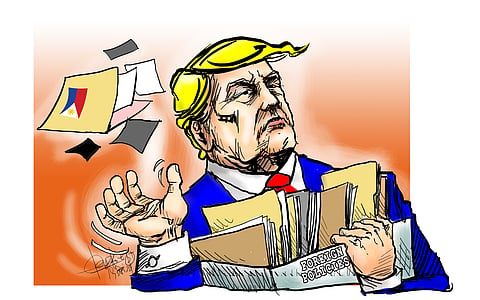
- NEWS
- the EDIT
- COMMENTARY
- BUSINESS
- LIFE
- SHOW
- ACTION
- GLOBAL GOALS
- SNAPS
- DYARYO TIRADA
- MORE

How alarmed should we be? We’re talking about the latest report of Nomura Global Markets Research on the dire effects on the economies of various countries in the Association of Southeast Asian Nation (ASEAN), particularly the Philippines, if GOP nominee Donald Trump is reelected US president in November.
The Japanese investment bank predicts that a Trump return to the White House could leave the Philippines vulnerable in various ways. For instance, a potential tightening of immigration policies in the US which is a major host country for Filipino expats, could reduce the growth in dollar remittances to the Philippines.
Overall, Nomura says Trump’s returning to the White House could have a deleterious effect on the country’s economic growth, that is, “lower than 0.2. percentage point than our baseline, though this is still manageable as we forecast gross domestic product growth of 6.1 percent year on year for 2025.”
This year, the Philippine government is targeting a 6-7 percent growth in the economy; it grew 6.3 percent in Q2. Nomura said directly hit would be the Philippines’ trade surplus with the US, which had inched up in recent years.
A Trump win would likely hit Philippine exports if he imposes the 10-percent tariff he said he would on goods coming into the US. Since the campaign started, Trump has said he will impose a 60-percent tariff, or higher, on Chinese imports. He has also been heard to say that he is considering imposing a 1O-percent universal tariff.
In terms of geopolitics, a Trump victory would heighten tensions in the South China Sea.
“The impact of a possible rise in geopolitical tensions in the South China Sea could be seen if the US, which is the Philippines’ strongest ally, provides less regional security and reduces its military presence under Trump,” said Nomura.
Last July, Secretary of State Antony J. Blinken made the rounds of Asia to assure US allies there is no need to worry about Washington’s commitments, a message that has become increasingly important as China’s power in the region grows.
But Blinken’s assurances do not answer in concrete terms the main question — will the US still be willing to invest significantly in Asia both economically and in terms of military assistance if Trump wins the presidency? He could say the US would if Vice President Kamala Harris wins, but no way can he speak for the Republican candidate.
“It would be challenging because countries in the region, China included, are looking beyond a Biden administration and thinking of the future,” points out Yun Sum, a director of the China program at Stimson Center, a research think tank in Washington.
The Biden administration’s allies in Asia fear that economic relations with the US would likely be impaired with Trump who, we reiterate, has spoken often about imposing higher tariffs on a wide range of goods from various countries if he wins.
The GOP candidate has also stated in no uncertain terms that countries relying on the US military for security should pay for such assistance.
Quite apparently, Trump has little regard for an American military presence overseas, including Asia, and has, on occasion, whined that Taiwan “doesn’t give us anything,” as he did during a conversation with Bloomberg Businessweek in late July.
Trump’s America First policy, if effected, would mean a much more bilateral rather than a multilateral approach to foreign policy.
In Asia, he will likely maintain a hawkish stance towards China. As a consequence, countries in Asia, including those in the ASEAN, will be pressed to take sides. Whose side will the Philippines take, if that comes to pass?
The America First approach of he whose hair is tinged blond-orange also means that Asia may have to rely less on the US as a defender of regional security.
Where then does that leave the Philippines? What will happen to the Enhanced Defense Cooperation Agreement (EDCA) bases on Philippine soil if the GOP candidate emerges as the winner in the US presidential polls in November?
